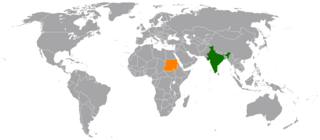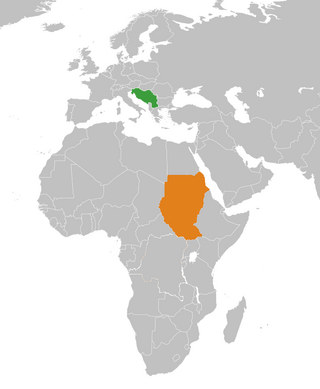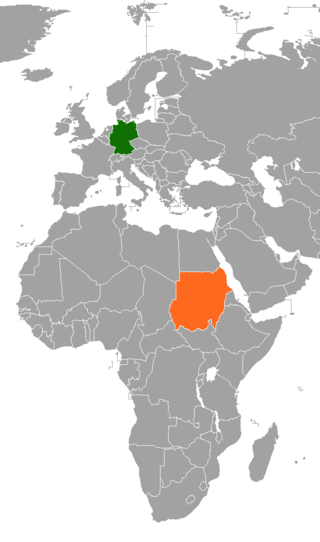
Khartoum or Khartum is the capital of Sudan. With a population of 6,344,348, Khartoum's metropolitan area is the largest in Sudan.

Sudan, officially the Republic of the Sudan, is a country in Northeast Africa. It borders the Central African Republic to the southwest, Chad to the west, Egypt to the north, Eritrea to the northeast, Ethiopia to the southeast, Libya to the northwest, South Sudan to the south, and the Red Sea to the east. It has a population of 45.7 million people as of 2022 and occupies 1,886,068 square kilometres, making it Africa's third-largest country by area and the third-largest by area in the Arab League. It was the largest country by area in Africa and the Arab League until the secession of South Sudan in 2011; since then both titles have been held by Algeria. Its capital and most populous city is Khartoum.

The foreign relations of Sudan are generally in line with the Muslim Arab world, but are also based on Sudan's economic ties with the People's Republic of China and Russia.

Sudan–United States relations are the bilateral relations between Sudan and the United States. The United States government has been critical of Sudan's human rights record and has dispatched a strong UN Peacekeeping force to Darfur. Relations between both countries in recent years have greatly improved, with Sudan's post-revolutionary government compensating American victims of al-Qaeda terror attacks, the removal of Sudan from the State Department's blacklist of state sponsors of terrorism and the United States Congress having reinstated Sudan's sovereign immunity in December 2020.

The Embassy of Syria in London was the diplomatic mission of the Syrian Arab Republic to the United Kingdom. The chancery is located at 8 Belgrave Square of London.

Bulgaria and Sudan established diplomatic relations on July 1, 1956. In 1967, Bulgaria sent the first Bulgarian ambassador to Khartoum. The activities of the Bulgarian embassy in Khartoum were terminated in April 1990, and later reestablished in March, 2005. In 2006 the General Consulate of the Sudan, in Sofia, Bulgaria was upgraded to the rank of embassy.

Sudan–United Kingdom relations are foreign relations between Sudan and the United Kingdom. Sudan has an embassy in London whilst the United Kingdom has an embassy in Khartoum. Most of the recent relations between the two countries centre on the region of Darfur.

India–Sudan relations, also called Indian-Sudanese relations or Indo-Sudanese relations, refers to the international relations that exists between India and Sudan.

Malaysia–Sudan relations refers to the bilateral ties between Malaysia and Sudan. Malaysia has an embassy in Khartoum, and Sudan has an embassy in Kuala Lumpur. Both countries are members of the Organisation of Islamic Cooperation.

The 2011–2013 protests in Sudan began in January 2011 as part of the Arab Spring regional protest movement. Unlike in other Arab countries, popular uprisings in Sudan had succeeded in toppling the government prior to the Arab Spring in 1964 and 1985. Demonstrations in Sudan however were less common throughout the summer of 2011, during which South Sudan seceded from Sudan, but resumed in force later that year and again in June 2012, shortly after the government passed its much criticized austerity plan.

Iran–Sudan relations refers to diplomatic, economic and military relations between Sudan and Iran. For nearly three decades, Iran and Sudan enjoyed a close relationship.
Mhasin Fadlalla is a Sudanese swimmer who competed in the women's 50 metre freestyle as one of two women in the Sudan squad at the 2012 Summer Olympics in London, United Kingdom.

The Embassy of South Sudan in London is the diplomatic mission of South Sudan in the United Kingdom.

Eritrea–Sudan relations have historically been tense, but have normalized in recent years.

Spain–Sudan relations are the bilateral and diplomatic relations between these countries. Sudan has an embassy in Madrid. Spain has an embassy in Khartoum.
Republic of Sudan v. Harrison, 587 U.S. ___ (2019), was a United States Supreme Court case from the October 2018 term. The Court held that civil service of a lawsuit against the government of Sudan was invalid because the civil complaints and summons had been sent to the Embassy of Sudan in Washington, D.C. rather than to the Sudanese Foreign Minister in Khartoum.

Sudan–Yugoslavia relations were historical foreign relations between Sudan and now split-up Socialist Federal Republic of Yugoslavia. Both countries were founding members of the Non-aligned Movement. President of Sudan Ibrahim Abboud personally participated in the 1961 Non-Aligned Conference in Belgrade. Relations between the two countries intensified after the failed 1971 Sudanese coup d'état when Sudan looked to replace its former ties with the Soviet Union with improved relations with Yugoslavia and the Socialist Republic of Romania.

Germany–Sudan relations are the current and historical relations between Germany and Sudan. The Federal Republic of Germany was the first country to recognize Sudan diplomatically in 1956. Due to its mediating position in the various armed conflicts in the country, Germany is a trusted partner for Sudan.



















